First thing I want to talk about is I Spent 5 Years with Some of Trump’s Biggest Fans. This article really got me out of my bubble, let me explain. For the longest time I’ve believed in an idea that people we live in bubbles. Within these bubbles’ reality exists that makes sense of the people who live in it. most bubbles you choose to live in but there are some which contain other bubbles like Venn diagrams. To this end all humans live in the bubble of humanity, or the basest line personification of human thought an experience. Therefore, it’s impossible to not live in a bubble and I’m no person who doesn’t. So, when it comes to myself, I find that I go into a very left of center political bubble or the bubble that consists people who think there left of center but are just a bunch of socialists who can’t commit to anything. So, hearing about these people’s political beliefs and their justification to why they believe in what they believe in Made me must take a real look at what I believed in politically and how they interpreted their surroundings and how at times I could relate to their feelings of shame in taking help. Knowing you need help and two-way subconscious degree are weak can can eat you up inside. A paradoxically makes you not like getting help even though you need it. Also just like in that article the different sources of where you get help from matter in the shame you feel by taking it. “A devoted Christian, Sharon’s mother believed in a generous church. But government benefits were a very different story. Taking them meant you’d fallen and weren’t proudly trying to rise back up.” Arlie Russell Hochshild. I vividly remember getting help from the teacher was fine but getting help from the assistant teacher who worked in the resource room it was bad. Because it would highlight how so you’re in the room that gets a very broad spectrum of children who have learning disabilities together. Do you know if I was born somewhere else would I still get the help that I needed to succeed? If I were born somewhere else would I have succeeded as much as I have so far? a similar sentiment is echoed by one of the people in the whiteness project I believe his name is Cameron. He says “R.D: “Again, I must call into question just how much of that is really coming from hard work and the grit. How much of it is because of the color of my skin, how much of that is handed to me?”. Then when you get down to it you really can only think about this you never will truly you there is no sign that you accomplished anything on your own. I think to a point that idea can get a bit ridiculous at times, but he does have major questions within it. For example, mostly your childhood is your parents doing and there’s no real shame in getting help from them as you grow but at a certain point it is expected of you to separate. And schools it environment where there supposed to get the first taste of your own hard work producing fruit but even then it’s not your own hard work it’s the work of your teachers who are teaching. So how much is really your effort of course you at the point effort into school in order to be successful but Are the ratios figured then we’d like them to be?
3/28/2019
How do economics shape the feelings and thinking of the people Hochschild profiles, especially their feelings and thinking about race, immigration, welfare, and other political issues?
I understand the shame of getting help. I understand how it feels when you must go the rely on others so you could do what needs to be done. Some days I like to pretend that I’ve overcome my days of needing help and having people work with me. Shame to the point where you remove vectors which can help you and other. Maybe I haven’t experienced it in a way that makes you angry I can recall several times not getting help when I should have biting me in the ass. That makes you the kind that makes you want everything that reminds you that you are weak to not exist. when I started reading this, I didn’t get how communities that use the services could have such a visceral hatred. I knew people who are not so enthusiastic about welfare and a large government apparatus but, to the extent of getting rid of stuff that helping. This isn’t just like oh I got to write in English paper tomorrow. This is if I don’t have food stamps, I’m going to starve. I severely lack the perspective to even understand this. Just reading this quote like fries my brain. “Sharon was a giving person, but she wanted to roll back government help. It was hard supporting her kids and being a good mom too. Managing the trailer park had called on her grit, determination, even hardness—which she regretted. She mused, “Having to cope, run the trailer court, even threaten to shoot a dog”—her tenant’s pet had endangered children—” it’s hardened me, made me act like a man. I hate that. It’s not really me.” There was a price for doing the right and necessary thing, invisible, she felt, to many liberals.” ARLIE RUSSELL HOCHSCHILD. She’s not being incoherent it’s just that I guess that I’ve been living in such a different bubbled in her that it’s hard for me to understand.
How does the gap between male lives at the top and male lives at the bottom relate to the idea (from “The Invention of Race”) that US slavery depended on a multi-class coalition of whiteness?
The gap between multi white guys on the top poor white guys on the bottom you know maybe at some point was smaller than it was today but I will never understand why their allies cause it seems like the rich guys get more out of the relationship then the white guys and it feels a lot more like a remnant of another time when he was much easier to align their interests but that’s just me talking. Maybe they benefited more than I see. “And what did that do? It switched their allegiance from the people in their same circumstance to the people at the top. It eventually created a multi-class coalition of people who would later come to be called white. It created a multi-class coalition. So, this was a divide and conquer strategy. It was completely brilliant.” Suzanne
Do you recognize any elements of the “Deep Story of Personal Protectionism” in the Whiteness Project videos we’ve been analyzing? If so, describe and explain at least two of them, being sure to indicate who is saying what and how prevalent each element is in our spreadsheet. Are there any other “Deep Stories” at play in the Whiteness Project videos? If so, what would you call them?
From where I am right now, I can’t really see any connections. I’m trying to see the connection now I can see the overall connections, but I can’t see on something that’s good to write about. I can see the general overlap with you know the people in these communities being predominantly white and the whiteness project being about people who are predominantly white, but I can’t really see the good connective tissue that really works in there.
The Invention of Race
The invention of races is part of a radio broadcast series their talks about how race came to be within the United States. This specific broadcast focuses on the direct origins within US society. like a lot of things, the United States the first kind of separation between white Europeans and Africans Was started by European specifically Portuguese propagandist for the Portuguese crown. the documentation of the local groups where Portugal was acquiring their slaves from where deliberately made to sound barbaric to justify the enslavement of the people. The second thing I learned was one of the first instances of perpetual servitude in the United States was a man by the name of John Punch. John punch was a former indentured servant who ran away from his master with two other men the other men were a Dutchman a Scotsman and got off with extended servitude sentences. While John punch was sentenced with perpetual servitude to his former master. I also learned how slavery was used to placate the lower classes in terms of the wealthier parts of society. It proved a cheap source of labor implicated those in the lower rung of society above the slaves. It’s really shaped how I view prevents like the civil war and slavery. like how I used to think that people supported the civil war in the S because of objectionable morals but now I’ve come to see it as a trick. Convincing people who are state rights wall it was just to keep their bottom lines intact.
Reading Log March 21
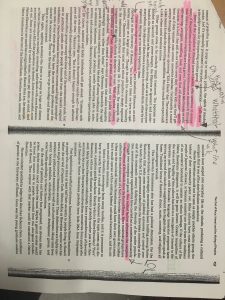
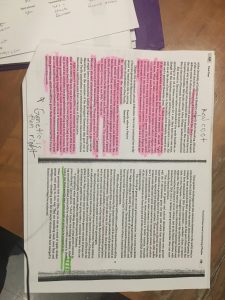
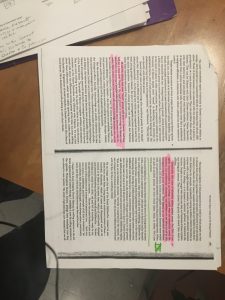
Exactly who is a Native Hawaiian
Why is it difficult to answer accurately “Exactly who is a Native Hawaiian?” Why does the answer to the question matter – both in everyday life in Hawaii and to us as we think about the realities of social identities?
Well, it’s probably difficult because what are the best tools you could use to discern that tends to complicate the issue then give you a clear answer. Genetics Has allowed us to find connections between animals we thought had gone long extinct and existent species. but when applied to humans it just makes things a whole lot more confusing. One of the people who read a project to find native Hawaiians even caution against using genetics to find them. “Yet she cautioned against using genetics to determine ethnicity. “I get people coming up to me all the time and saying, “Can you prove that I’m a Hawaiian?” PRA 40
If the concept of race has no genetic basis, why does it persist in society? What economic, political and/or cultural functions does it play that keep it alive? This is a Text+ME question.
One of the social aspects keeping it alive is how wealth likes perpetuating and isolating itself. Olson Points this out “People of all ethnic backgrounds live side by side, just as they did in the camp towns. The only people who live in ghettos are the soldiers on military bases and wealthy haoles who wall themselves off in gated communities.” PRA 24. This is due to geographical barriers again improving as potent separators between groups. Another thing is the school barrier. When people grow up together, they tend to be more amenable to them no matter what social groups there from kid don’t care if you’re fun to play with. One way to get kids from different backgrounds to interact is to have them go to the same schools. One very vivid memory I have of is when I went to school in New York Public School in Queens. Now New York public schools have very mixed reputations, but from what I’m able to surmise the elementary schools were pretty good. Something the school would do every year was a culture day. On this day they would set up that she leaves him with budget tables and parents would volunteer to cook traditional dishes from their culture. You paid the admission fee and you were given a roll of like 5 tickets and you get to go to tables and sample some food and learn things about other people’s cultures. I remember all kinds of weird dishes from different cultures. I was especially excited because my mom had volunteered to cook Irish food since my family comes from a predominantly Irish background and that was not as common as It was in my high school. The first time I really realize this was when I was part of a modeling United Nations club in my high school and we were suggesting fundraiser ideas and I remembered the culture day. So, I suggested doing something like that with that the realization quickly dawned on me and everyone in the room that the school was not diverse enough to do such a thing. A major of the student body was from a roughly white European background, but when compared to the other high schools in the surrounding area we were the diverse school. Another economic divider is redlining which is extensively taken place in the nearby city of Bridgeport which really kept a lot of minorities in poverty in the city. Note I am stopping here Because if I don’t, I’ll be here all night.
M. March 18 Pictures
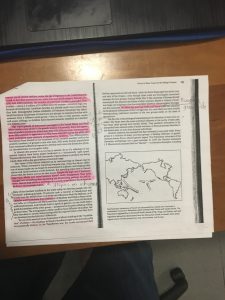

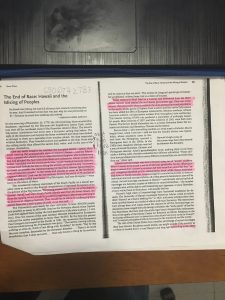
M. March 18
What vision of the future has academics and scholars pinned on Hawaii’s high-rate of intermarriage? On what facts and hopes have they based this vision? In Olson’s view, how likely is their vision of a racially-mixed future to be accurate?
In the essay The End of Race: Hawaii and The Mixing of People by Steve Olson it talks about the growing high level of intermarriage and racial mixing within Hawaii and the USA at large. The hope is that this leads to the steaded erosion of race as a divider within society, but the paper is cautious to say that this will definitively end to racism. On this note, Steve says “Despite the high rate of intermarriage here, ethnic and racial tensions haven’t really disappeared. They have changed into something else. Something less threatening, perhaps, but still divisive. Hawaii may well be a harbinger of a racially mixed future. But it won’t be the future many people expect.” Pra11
What are the implications for “ethnic thinking” of recent genetic research showing that “every group is a mixture of many previous groups, a fleeting collection of genetic variants drawn from a shared genetic legacy” (253)?
Ethnic Thinking is a type of thinking that forms, when groups of share geographical area develop a, hated between each other. These people are not very genetical different. “The antagonists in these conflicts have different ethnicities, but they have been so closely linked biologically throughout history that they have not developed marked physical differences.” Pra12.
In what sense is “race” real? What would it take for there to be an end to racism?
It’s is really in a sense of the tribe. It the idea that tribe transients direct social connections. Will it end? In all likelihood in mainstream society, yes. There will always be some holdout, but as our world gets smaller it is getting more and more disadvantages, economically and socially, to discriminate and hate along seemingly stupid line of in the sand.
Plan for Better English Essays
- More annotation — Make then the beacons that help direct quotes and Essay structure. Record your reaction to the paper to the paper, Asks questions, Chunk the paper into sections, do text to text, self, and, world, challenge ideas in the paper
- Better Quote — Fill Quote File with useful quotes and words
- Better MLA — Do the MLA this time
- More refined edits — Editing needs some work
- Critique — Use UNE google account to share and review paper
- Better Read of Materials — Read better
- Better Connection — To the text and the question asked
7 March in nutshell
In what variety of ways do our social identities shape our personal identities, our minds, our relationships, our lives, our life paths, our prospects, our sense of America and the American Dream?
A social identity is what everyone gets to see. It’s the you who goes to the bank, it’s the you who ride the train to work, and, it’s the one who talks to your acquaintances at the office. It usually reflects social norms with minor degrees of variants in a variety of different aspects. These slight variances are only small indicators of what lies below the immediate surface. Weather conscious or not we all have these small little tells which signal the true person we are below. Our personal identities are far more elusive. Maybe only a hand full of people will get to see this side of you the real you behind the mask that lured them in. Even then it can be very difficult for one to connect with their true self. As it can take years of self-reflection to truly get at who you are as a person. So, if it is the case that it’s hard to contact with your personal identity can your social identity affect who you are? For instance, Ta-Nehisi Coates as a child grew up on the streets of Baltimore and his social identity was an all-consuming. This was due to the danger of the streets. The fact that if there was even the smallest crack in the social identity it could result in your death. Mike Rose grew in a similar situation but dealt with it differently he ignores it. He just kept to himself and didn’t pay attention to the streets.
Our minds and our relationships kind of go hand in hand. From day one of our lives our minds are shaped by our caretakers whether these are our mother and father or Legal guardians. They Are for a time some of the only human beings you know and the only ones you get to learn from and Thus shape an immense part of your life and how you think. They can pass on cultural traditions, local social norms, and, mindsets and these sorts of things shape how you think and how your mind works. This also suddenly influences how you seek out relationships with other people. Thus, our mindsets affect how we find new relationships. Coates parents had to teach him about the street from a early age and how they swallow people whole. They had to stop that, so they need to shape him to survive the streets. To make sure he learned the lessons that would be crucial for him to survive they would need to take some extreme measures, but all necessary. Coates says it himself “My father was so very afraid. I felt it in the sting of his black leather belt, which he applied with more anxiety than anger, my father who beat me as if someone might steal me away, because that is exactly what was happening all around us.” (Coates pg16) Rose’s family where Strangers in an unknown land not knowing what kind of environment, they work in for the rules to survive they just isolate themselves from it, but this also isolates them from other people as their struggles go unnoticed by the community.
Our lives and our life paths again just like our minds and our relationships share a heavy correlation with each other. As the way someone lives their life affects where they go in life. Now the way someone lives their life obviously can be in varying degrees of control of the person who lives it. So, people are not totally responsible for their life path, but it is still expected that at points in which would have required self-agency that someone take it in order to get themselves a respectable life path. however, this does bring up how circumstantial life path are at times. It’s not to say that people cannot achieve a goal even if they work for it. It’s more saying that certain people are set up better to achieve certain goals. This inequality means that certain people tend to end up in certain places in society while others tend to end up in other places. For example, a person from an upper-class family is more likely to stay in the upper class then someone from the lower classes to enter the upper classes. Now you can look at this in a lot of ways like one way is that there is a systemic biased for people being the upper class staying in the upper class and for people who were poor to stay poor or you could see it as a table of probabilities in ratios that usually trend out to stay wherever they are. Coates Would find himself at the far end probability of getting out of a situation if it wasn’t for his love of writing he would have never gotten out just like Rose “We wrote three of four essays a month. We read a book every two to three weeks, starting with the Iliad and end up with Hemingway. He gave us quiz on the reading every other day. He brought a prep school curriculum to Mercy High” (Rose pg 32).
So much affect someone’s path where there from, who is they family, what goals that what to accomplish. Where the limit is what education you have and what biases surrounding you. Working harder and better to clime the ladder of work and accomplishment.
Source Cited
Rose. Lives on the Boundary. Prentice Hall, 2002.
Coates, Ta-Nehisi, and Klaus Amann. Between the World and Me. Reclam, 2017.
